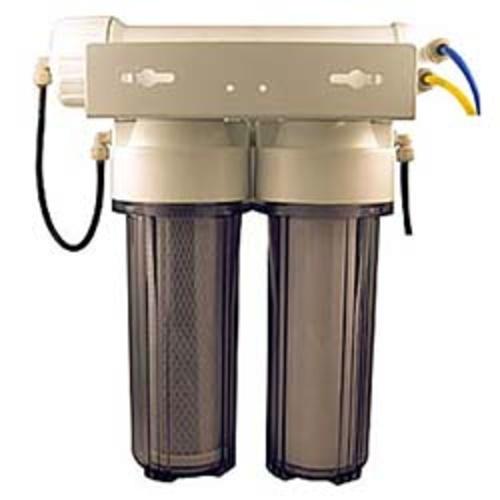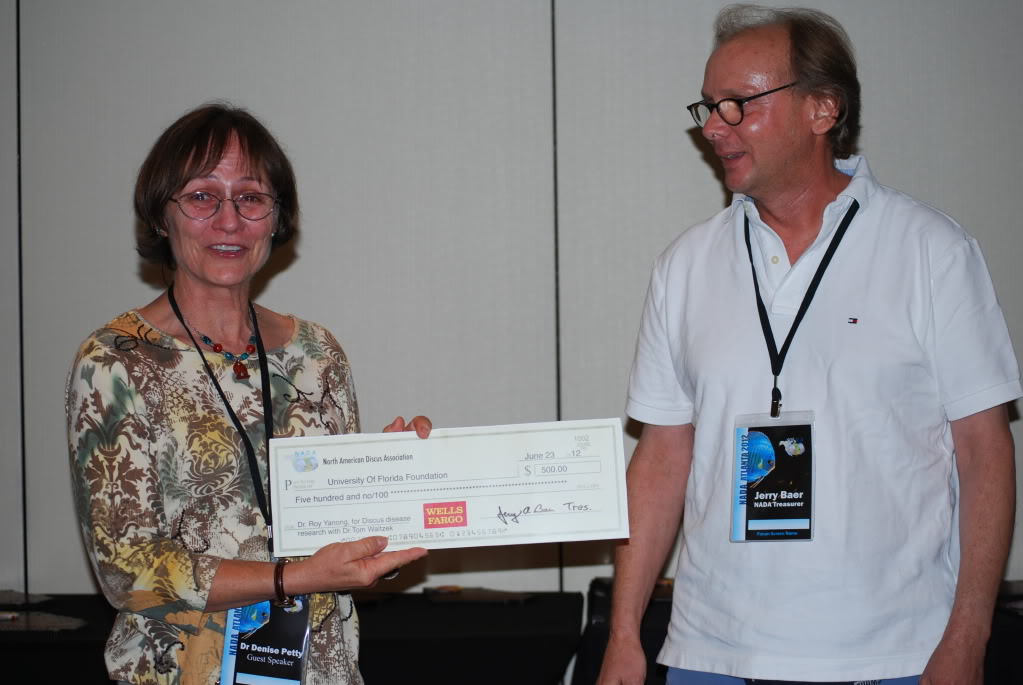Article I
Offices
We are a collection of discus enthusiasts who are interested in the advancement, improvement, and promotion of discus fish. Our goal is to educate the general public, encourage new members, provide information on discus, promote and provide judges for discus at fish shows.
The North American Discus Association (NADA), a nonprofit corporation, shall be located in Canyonville, Douglas County, Oregon. The NADA shall have and continuously maintain in Oregon a registered office and a registered agent at the same location as required by the Non-Profit Corporation Act. The registered office and the address of the registered office may be, but need not be, identical with the principal office; and may be changed from time to time by the Board of Directors.
Article II
Members
Section 1. Eligibility: Anyone interested in keeping discus is eligible to be considered for membership.
Section 2. How to join: Candidates may join the NADA upon written application accompanied by payment of dues. There will be two types of membership: individual membership and family membership. Family membership shall be defined as no more than two adult members and all children up to and including 17 years of age. Family members upon reaching the age of 18 must pay for individual membership unless they are one of the two adult members of a family membership.
Section 3. Voting rights: Each individual member will be entitled to one vote. Family memberships have the authority of two votes.
Section 4. Termination of membership: Memberships may be terminated:
a. By resignation. Any member in good standing may resign from NADA upon written notice to the Secretary; but no member may resign when in debt to NADA. Dues obligations are considered a debt to NADA and they become incurred on the first day of AUGUST each fiscal year. UPON ACCEPTANCE FOR MEMBERSHIP AND EACH YEAR THEREAFTER ON THE FIRST DAY OF AUGUST EACH FISCAL YEAR.
b. By lapsing. A membership will be considered as lapsed and automatically terminated if a member’s dues remain unpaid 60 days after the due date. However, the board may grant an extension of 30 days grace to delinquent members in special cases. No member will be entitled to vote at any meeting whose dues are unpaid as of the date of that meeting.
c. By removal. Any member may be removed from membership by a two-thirds (2/3) vote of the Board of Directors for conduct that is detrimental to the harmonious functioning of the club, or for other conduct inconsistent with the privileges of membership, or other good and sufficient cause, as determined by the Board of Directors. Action of the Board of Directors shall be conclusive, final and binding.
d. Reinstatement after removal. Upon written request signed by a former member and filed with the secretary, the Board of Directors may, by the affirmative vote of 2/3 of the members of the board, reinstate the former member to membership upon such terms as the Board of Directors may deem appropriate.
Article III
Meetings
Section 1. Annual Meeting: An annual meeting of the members shall be held in conjunction with the bi-annual North American Discus Association (NADA) convention or may be held on-line for the purpose of transacting business. If the election of directors is not held prior to the annual meeting then, the Board of Directors shall cause the election to be held during the annual meeting.
Section 2. Special Meetings: A special meeting of the members may be called by the President, the Board of Directors, or upon receipt of a petition signed by five members in good standing. Special meetings shall be held at the location determined for the regular meeting or may be held on-line.
Section 3. Place of Meeting: Regular meetings shall be held at a time and place designated by the Board of Directors and may be held on-line at a location to be determined by the Board. The President with approval of the Board may change the time or date of a meeting.
Section 4. Notice of Meeting: Written notice stating the place, day and hour of any meeting of membership shall be delivered, either personally, by mail, e-mail or electronic notice to each member entitled to vote not less than seven days before the date of the meeting. If a Special Meeting is called the purpose for the meeting shall be stated in the notice.
Section 5. Quorum: The quorum for any annual, special or regular meeting shall be 25% of the members in good standing or 20 members, which ever is the smaller number.
Section 6. Parliamentary Procedure and Standing Rules
The Rules contained in Roberts Rules of Order, Newly Revised shall govern NADA in all cases to which they are applicable and in which they are not inconsistent with these bylaws and any policies, standing rules or adopted procedures. At meetings and board meetings of NADA the order of business, so far as the nature and character of the meeting may permit, shall be as follows:
1. Reading of minutes of last meeting
2. Report of president
3. Report of secretary
4. Report of treasurer
5. Report of committees
6. Election of officers and board (at annual meeting)
7. Unfinished business
8. New business
9. Adjournment
Article IV
Board of Directors
Section 1. General Powers: The Board of Directors shall manage the affairs of NADA.
Section 2. Number, Tenure and Qualifications: The Board of Directors shall consist of elected officials (President, Vice-President, Secretary, Treasurer), and seven Directors at Large including the immediate Past-President (if there is one). Each director shall hold office for a period of two or three years until the next annual meeting of members and until his successor has been elected.
Section 3. Regular meetings: The annual meeting of the Board of Directors shall be held without other notice than this by-law, immediately after and at the same place as, the annual meeting of members. The Board of Directors may provide by resolution the time and place for additional meetings without other notice than the resolution.
Section 4. Special Meetings: The President or any two Directors may call special meetings of the Board of Directors. Special meetings may be held on-line or any location set by the Board.
Section 5. Notice of Special Meetings: Written notice stating the place, day and hour of a special meeting of the Board shall be delivered, either personally, by mail, e-mail or electronically to each Director not less than two days before the date of such meeting. If a Special Meeting is called the purpose for the meeting shall be stated in the notice.
Section 6. Quorum and manner of acting: A majority of the Board of Directors shall constitute a quorum for the transaction of any business at any meeting of the Board. The act of a majority of the Directors present at a meeting at which a quorum is present shall be the act of the Board of Directors.
Section 7. Attendence: Each Director shall attend all on-line meetings and shall announce their attendance in written form.
Section 8. Vacancies: Any vacancy occurring in the Board of Directors may be filled by an affirmative vote of a majority of the remaining Directors. A Director elected to fill a vacancy shall be elected for the remaining term of his predecessor in office.
Section 9. Compensation: Directors shall not receive any stated salaries for their services, but by resolution of the Board of Directors a fixed sum may be paid for expenses of attendance.
Article V
Officers
Section 1. Officers: The officers of the NADA shall be a President, Vice-President, Secretary, Treasurer, and seven Directors at Large including the immediate Past-President (if there is one).
Section 2. Election and term of office: The officers of the NADA shall be elected annually for a term of two years. If the election of directors is not held prior to the annual meeting then, the Board of Directors shall cause the election to be held during the annual meeting. New offices may be created and filled at any meeting of the Board of Directors. Each officer shall hold office until his successor has been duly elected and qualified.
Section 3. Removal: The Board of Directors may remove any officer elected or appointed by the Board of Directors whenever they determine removal is in the best interest of the NADA.
a. Any Officer or Board member wishing to resign shall submit his resignation in writing to the Board for disposition by the Board.
b. An Officer or Director may be removed from office in the following manner: written notice of the charges against said Officer or Director shall be submitted to the Board. After a majority vote by the Board upholding the charges, the removal request shall be effective immediately.
i. The Board of Directors is authorized to appoint interim board members at large to serve until the next general election. The appointee must meet all criteria of any other elected officer of the Society, and must maintain the status of active member for the duration of his/her tenure on the board.
ii. In the case of any other elected officer, the Board of Directors is authorized to appoint an interim substitute who, meeting all criteria for election, shall be ratified by the general membership at the next general meeting.
iii. Removal of Officers, after Board approval, shall be submitted to the general membership for vote at the next General Meeting and requires a majority vote of the members to pass. Said vacant position shall be filled as soon a possible as provided for in Article VII, Section 1.
c. Grounds for removal shall be misconduct in office, willfully violating the constitution or bylaws, or willfully bringing injury or discredit to the Society. Failure to attend either four consecutive meetings of any kind, or two consecutive meetings of the Board shall also be grounds for removal from Office.
Section 4. Vacancies: A vacancy in any office because of death, resignation, removal, disqualification or otherwise may be filled by the Board of Directors for the remaining portion of that term.
Section 5. President: The President shall be the principal executive officer of the NADA, shall preside at all meetings of the NADA and exercise general supervision over the activities of the NADA. The President may provide the second signature on checks, contracts or other instrument, which the Board of Directors has authorized to be executed.
Section 6. Vice President: The Vice President shall assume the duties of the President in his absence and shall assist in the duties of the President at his direction. The Vice President shall also be responsible for setting up the monthly BOD meeting agenda, calling the meeting to order and closing the meeting.
Section 7. Treasurer: The Treasurer shall keep a record of all financial transactions in a manner approved by the Board and concurrent with accepted accounting procedures; shall submit a report at each regular and annual meeting for Board approval; shall be responsible for the collection of all monies due the NADA; shall notify members when dues are delinquent; shall keep a record of all requests and authorization for payment; shall make payments from the general treasury upon authorization of the Board; shall keep charge of the NADA bank account; and shall give a complete financial report annually. Checks shall be written by the Treasurer and signed by both the Treasurer and the President. Books of the Treasurer may be audited at the end of each fiscal year, at the discretion of the Board. The Treasurer shall notify the membership chairman of dues received and shall be responsible for preparing the annual operating budget to be presented to the Board at the March budget meeting. All requests for general funds, or reimbursements for expenses, shall be submitted to the board for approval.
Section 8. Secretary: Duties of the Secretary. The Secretary shall keep a record of all minutes of the NADA regular and business meetings, and shall publish the minutes in the NADA newsletter or website. During the monthly BOD meeting the Secretary shall also organize and collect the results for any vote or poll which shall be published as part of the meeting minutes.
Section 9. Past President: The immediate Past President shall be an ex-officio member of the Board of Directors and shall assist the President in the administration of the NADA. The Board of Directors may establish other duties.
Section 10. Eligibility for Office: Any adult member in good standing shall be eligible for office. The positions of President, Vice President, Treasurer and Secretary may only be filled with an active member of at least one year.
Section 11. Elections:
1. The President shall accept board nominations in written form for office which are presented to the membership at a regular meeting at least two months (July) prior to the annual meeting. Additional nominations may be made from the floor at this time, after which nominations will be closed.
2. A majority written or electronic ballot of members shall elect officers at the regular meeting (third week of September) prior to the annual (September) meeting.
3. Officers shall take office at the annual meeting (September).
4. In the event of resignation of the President, the Vice President shall assume the office of President and a new Vice President shall be elected by the membership.
Article VI
Committees
Section 1. Committees of directors: The Board of Directors, by resolution adopted by a majority of the Directors in office, may designate and appoint one or more committees. The committees, to the extent provided in the resolution, shall have the authority of the Board of Directors, except that no such committee shall have the authority of the Board of Directors in reference to amending, altering or repealing the bylaws; electing, appointing or removing any member of any committee or any Director or officer of the corporation; amending or restating the articles of incorporation; adopting a plan of merger or adopting a plan of consolidation with another corporation; authorizing the sale, lease, exchange or mortgage of all or substantially all of the property and assets of the corporation; authorizing the voluntary dissolution of the corporation; adopting a plan for the distribution of the assets of the corporation; or amending, altering or repealing any resolution of the Board of Directors which by its terms provides that it shall not be amended, altered or repealed by such committee. The designation and appointment of any such committee and the delegation thereto of authority shall not operate to relieve the Board of Directors, or any individual Director, of any responsibility imposed upon it or him by law.
Section 2. Other committees:
1. SHOW COMMITTEE – shall be responsible for all matters pertaining to shows, rules, correspondence, judges, etc.
2. PUBLICATION COMMITTEE – shall be responsible for issuing a Society newsletter and literature, and shall handle all related business.
3. PROGRAM COMMITTEE – shall be responsible for providing a program for all annual meetings and shall be allowed a budget for renting programs if necessary.
4. PUBLICITY COMMITTEE – shall be responsible for providing publicity for the___, i.e. providing posters to pet shops, issuing meeting notices to media outlets, and any other means of promoting the Society.
5. WEBSITE COMMITTEE – shall be responsible for maintaining the NADA website.
6. RAFFLE COMMITTEE – shall administer the raffles.
Section 3. Term of Office: Each member of a committee shall serve until the next annual meeting of the NADA and until his successor is appointed, unless the committee is terminated, or the member is removed from the committee, or the member ceases to qualify as a member of NADA.
Section 4. Chairman: Each committee will have a chairman appointed by the Board of Directors.
Section 5. Vacancies: Vacancies in any committee may be filled by appointments made in the same manner as provided in the case of the original appointments.
Section 6. Quorum: Unless otherwise provided in the resolution of the Board of Directors designating a committee, a majority of the whole committee shall constitute a quorum The act of a majority of the members present at a meeting at which a quorum is present shall be the act of the committee.
Section 7. Rules: Each committee may adopt rules for its own government as long as they are not inconsistent with these by-laws or with rules adopted by the Board of Directors.
Article VII
Contracts, Checks, Deposits and Funds
Section 1. Contracts: The Board of Directors may authorize any officer or agent of the NADA, to enter into a contract or execute and deliver any instrument in the name of and on behalf of the NADA, and such authority may be general or confined to specific instances.
Section 2. Checks, Drafts, etc.: All checks, drafts or orders for the payment of money, shall be signed by two officers, and in such manner as shall be determined by resolution of the Board of Directors. In the absence of such determination by the Board of Directors, such instruments shall be signed by the Treasurer and countersigned by the President or a Vice President of the NADA.
Section 3. Deposits: All funds of the NADA shall be deposited within 7 days of the date of receipt to the credit of the corporation in a bank selected by the Board of Directors.
Section 4. Gifts: The Board of Directors may accept on behalf of the NADA any contribution or gift for the general purposes or for any special purpose of the NADA.
Article VIII
CERTIFICATES OF MEMBERSHIP
SECTION 1. Certificates of Membership: The Board of Directors may provide for the issuance of a certificate of membership in NADA, which shall be in a form determined by the Board. All membership certificates shall be consecutively numbered. The name and address of each member and the date of issuance of the certificate shall be entered in the records of the NADA. If any certificate becomes lost, mutilated or destroyed, a new certificate may be issued upon such terms and conditions as the Board of Directors determine.
SECTION 2. Issuance of Certificates: When a member has been elected to membership and has paid dues, a certificate of membership may be issued in his name and delivered to him by the Secretary, if the Board of Directors shall have provided for the issuance of certificates of membership under the provisions of Section 1 of this Article VIII.
Article IX
Books and Records
The NADA shall keep correct and complete books and records of account and shall also keep minutes of the proceedings of its members, Board of Directors and committees having any of the authority of the Board of Directors, and shall keep at its registered or principal office a record giving the names and addresses of the members entitled to vote. Any member, or his agent or attorney may inspect all books and records of the corporation, for any proper purpose at any reasonable time.
Article X
Fiscal Year
The fiscal year of the corporation shall begin on the first day of August and end on the last day of July in each year.
Article XI
Dues
Section 1. Annual Dues: The Board of Directors has determined annual dues will be $10.00 for an individual and $12.00 for a family.
Section 2. Payment of dues: Dues shall be payable in advance for one years of membership and are due every 12 months thereafter.
Section 3. Default and termination of membership: When any member is in default in the payment of dues for a period of 60 days from the first day of August, his membership may be terminated by the Board of Directors in the manner provided in Article II of these bylaws.
Article XII
Seal
The Board of Directors may provide a corporate seal, which may be in the form of a circle and shall have inscribed thereon the name of the corporation and the words “Corporate Seal.”
Article XIII
Waiver
Whenever any notice is required to be given under the provisions of the Oregon Non-Profit Corporation Act or under the provisions of the articles of incorporation or the by-laws of the corporation, a waiver thereof in writing signed by the person or persons entitled to such notice, whether before or after the time stated therein, shall be deemed equivalent to the giving of such notice
ARTICLE XIV
No person shall possess any property right in or to the property or assets of the corporation.*Upon dissolution of this corporation as provided in the Bylaws, all assets remaining after payment of any outstanding liabilities shall be distributed exclusively to charitable, religious, educational or scientific organizations which would then qualify under the provisions of Section 501(c)(3) of the Internal Revenue Code and its regulations as such Section and regulations now exist or may hereafter be amended, or under corresponding laws and regulations hereafter adopted and which organizations have purposes and objects similar to those of the corporation, all determined in accordance with the Bylaws.
Article XV
Amendments to Bylaws
These bylaws may be altered, amended or repealed and new bylaws may be adopted by a majority of the Directors present at any regular meeting or at any special meeting, if at least two days’ written notice is given of the intention to alter, amend, repeal or adopt new bylaws at such meeting.
NADA Conflict of Interest Policy
Article I
Purpose
The purpose of the conflict of interest policy is to protect this tax-exempt organization’s (Organization) interest when it is contemplating entering into a transaction or arrangement that might benefit the private interest of an officer or director of the Organization or might result in a possible excess benefit transaction. This policy is intended to supplement but not replace any applicable state and federal laws governing conflict of interest applicable to nonprofit and charitable organizations.
Article II
Definitions
1. Interested Person:
Any director, principal officer, or member of a committee with governing board delegated powers, who has a direct or indirect financial interest, as defined below, is an interested person.
2. Financial Interest:
A person has a financial interest if the person has, directly or indirectly, through business, investment, or family:
a. An ownership or investment interest in any entity with which the Organization has a transaction or arrangement,
b. A compensation arrangement with the Organization or with any entity or individual with which the Organization has a transaction or arrangement, or
c. A potential ownership or investment interest in, or compensation arrangement with, any entity or individual with which the Organization is negotiating a transaction or arrangement.
Compensation includes direct and indirect remuneration as well as gifts or favors that are not insubstantial.
A financial interest is not necessarily a conflict of interest. Under Article III, Section 2, a person who has a financial interest may have a conflict of interest only if the appropriate governing board or committee decides that a conflict of interest exists.
Article III
Procedures
1. Duty to Disclose
In connection with any actual or possible conflict of interest, an interested person must disclose the existence of the financial interest and be given the opportunity to disclose all material facts to the directors and members of committees with governing board delegated powers considering the proposed transaction or arrangement.
2. Determining Whether a Conflict of Interest Exists
After disclosure of the financial interest and all material facts, and after any discussion with the interested person, he/she shall leave the governing board or committee meeting while the determination of a conflict of interest is discussed and voted upon. The remaining board or committee members shall decide if a conflict of interest exists.
3. Procedures for Addressing the Conflict of Interest
a. An interested person may make a presentation at the governing board or committee meeting, but after the presentation, he/she shall leave the meeting during the discussion of, and the vote on, the transaction or arrangement involving the possible conflict of interest.
b. The chairperson of the governing board or committee shall, if appropriate, appoint a disinterested person or committee to investigate alternatives to the proposed transaction or arrangement.
c. After exercising due diligence, the governing board or committee shall determine whether the Organization can obtain with reasonable efforts a more advantageous transaction or arrangement from a person or entity that would not give rise to a conflict of interest.
d. If a more advantageous transaction or arrangement is not reasonably possible under circumstances not producing a conflict of interest, the governing board or committee shall determine by a majority vote of the disinterested directors whether the transaction or arrangement is in the Organization’s best interest, for its own benefit, and whether it is fair and reasonable. In conformity with
the above determination it shall make its decision as to whether to enter into the transaction or arrangement.
4. Violations of the Conflicts of Interest Policy
a. If the governing board or committee has reasonable cause to believe a member has failed to disclose actual or possible conflicts of interest, it shall inform the member of the basis for such belief and afford the member an opportunity to explain the alleged failure to disclose.
b. If, after hearing the member’s response and after making further investigation as warranted by the circumstances, the governing board or committee determines the member has failed to disclose an actual or possible conflict of interest, it shall take appropriate disciplinary and corrective action.
Article IV
Records of Proceedings
The minutes of the governing board and all committees with board delegated powers shall contain:
a. The names of the persons who disclosed or otherwise were found to have a financial interest in connection with an actual or possible conflict of interest, the nature of the financial interest, any action taken to determine whether a conflict of interest was present, and the governing board’s or committee’s decision as to whether a conflict of interest in fact existed.
b. The names of the persons who were present for discussions and votes relating to the transaction or arrangement, the content of the discussion, including any alternatives to the proposed transaction or arrangement, and a record of any votes taken in connection with the proceedings.
Article V
Compensation
a. A voting member of the governing board who receives compensation, directly or indirectly, from the Organization for services is precluded from voting on matters pertaining to that member’s compensation.
b. A voting member of any committee whose jurisdiction includes compensation matters and who receives compensation, directly or indirectly, from the Organization for services is precluded from voting on matters pertaining to that member’s compensation.
c. No voting member of the governing board or any committee whose jurisdiction includes compensation matters and who receives compensation, directly or indirectly, from the Organization, either individually or collectively, is prohibited from providing information to any committee regarding compensation.
Article VI
Annual Statements
Each director, principal officer and member of a committee with governing board delegated powers shall annually sign a statement which affirms such person:
a. Has received a copy of the conflicts of interest policy,
b. Has read and understands the policy,
c. Has agreed to comply with the policy, and
d. Understands the Organization is charitable and in order to maintain its federal tax exemption it must engage primarily in activities which accomplish one or more of its tax-exempt purposes.
Article VII
Periodic Reviews
To ensure the Organization operates in a manner consistent with charitable purposes and does not engage in activities that could jeopardize its tax-exempt status, periodic reviews shall be conducted. The periodic reviews shall, at a minimum, include the following subjects:
a. Whether compensation arrangements and benefits are reasonable, based on competent survey information, and the result of arm’s length bargaining.
b. Whether partnerships, joint ventures, and arrangements with management organizations conform to the Organization’s written policies, are properly recorded, reflect reasonable investment or payments for goods and services, further charitable purposes and do not result in inurement, impermissible private benefit or in an excess benefit transaction.
Article VIII
Use of Outside Experts
When conducting the periodic reviews as provided for in Article VII, the Organization may, but need not, use outside advisors. If outside experts are used, their use shall not relieve the governing board of its responsibility for ensuring periodic reviews are conducted.











No Comments Yet